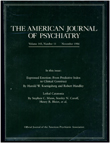Factors associated with a successful insanity plea
Abstract
The authors present data on all insanity pleas (N = 202) in Erie County, New York, between 1970 and 1980. No demographic, criminal history, current offense, or history of mental hospitalization factor was associated with acquittal. Of the variables studied, only the recommendation of the forensic examiner was associated with the court's decision to acquit by reason of insanity. When an insanity acquittal was recommended in the examination report, conviction ensued in only 17% of the cases. The proportion of pleas that were successful varied considerably over the 10 years studied. The authors discuss the critical need for more research on the plea stage of insanity defense proceedings.
Access content
To read the fulltext, please use one of the options below to sign in or purchase access.- Personal login
- Institutional Login
- Sign in via OpenAthens
- Register for access
-
Please login/register if you wish to pair your device and check access availability.
Not a subscriber?
PsychiatryOnline subscription options offer access to the DSM-5 library, books, journals, CME, and patient resources. This all-in-one virtual library provides psychiatrists and mental health professionals with key resources for diagnosis, treatment, research, and professional development.
Need more help? PsychiatryOnline Customer Service may be reached by emailing [email protected] or by calling 800-368-5777 (in the U.S.) or 703-907-7322 (outside the U.S.).



